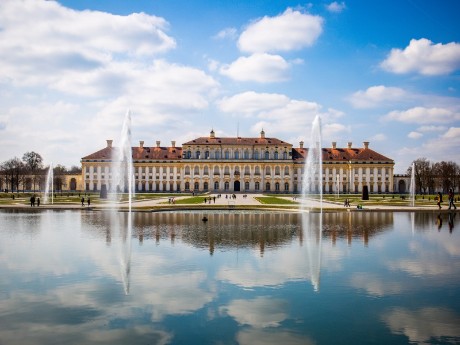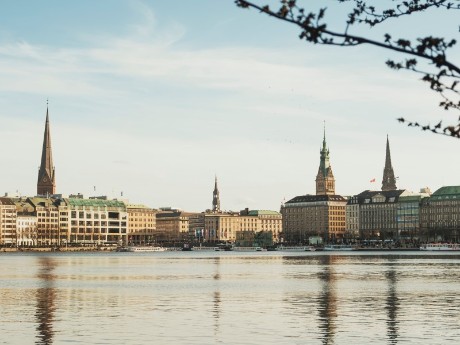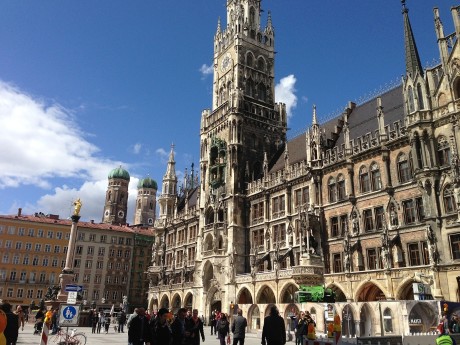VIP/Exclusive Germany: Munich & Hamburg
Munich and Hamburg, two distinct German cities, beckon visitors with a wealth of cultural treasures and vibrant experiences. In Munich, immerse yourself in the rich history showcased at landmarks like Marienplatz and Nymphenburg Palace. Don't miss the world-renowned Oktoberfest, an extravaganza of Bavarian traditions and, of course, exceptional beer. Visit the Deutsches Museum or revel in artistic masterpieces at Lenbachhaus.
Read more
Munich and Hamburg, two distinct German cities, beckon visitors with a wealth of cultural treasures and vibrant experiences. In Munich, immerse yourself in the rich history showcased at landmarks like Marienplatz and Nymphenburg Palace. Don't miss the world-renowned Oktoberfest, an extravaganza of Bavarian traditions and, of course, exceptional beer. Visit the Deutsches Museum or revel in artistic masterpieces at Lenbachhaus. Nestled along the banks of the Elbe River in northern Germany is your next stop, Hamburg. This city seamlessly blends its rich maritime heritage with modern attractions and a bustling cultural scene. Embark on boat tours, explore historic ships, or simply soak in the maritime atmosphere at one of the waterfront cafes. Explore the captivating Miniatur Wunderland and marvel at the modern architectural gem, the Elbphilharmonie. Enjoy your stay at some of the best hotels in the cities. Whether savouring delicacies in Munich or embracing Hamburg's maritime charm, both cities promise an unforgettable blend of history, culture, and contemporary excitement. Waterviews strives to offer accommodation options within walking distance of water and/or in an area of touristic interest. Our prices include taxes (but excludes local tourist taxes). Customize your trip to your personal preferences with optional activities (hit the “Add Activities’’) or change hotels, etc. Contact us for customization at no extra cost at: Service@waterviewstravel.com
Destinations
- Munich
- Hamburg
Itinerary
Munich

Munich is located near the snow-capped Bavarian Alps and boasts beautiful nature all around as well as many green spaces and parks within the city. It is a modern metropolis, home to the world-renowned BMW cars, but also honours its traditions, the most well-known being the Oktoberfest, which is an ode to Munich’s many breweries. Those interested in sampling local dishes should head to the Victuals Market or any of the beer gardens, while for a more sophisticated experience several world-class museums await to be visited.
Read more
Munich is located near the snow-capped Bavarian Alps and boasts beautiful nature all around as well as many green spaces and parks within the city. It is a modern metropolis, home to the world-renowned BMW cars, but also honours its traditions, the most well-known being the Oktoberfest, which is an ode to Munich’s many breweries. Those interested in sampling local dishes should head to the Victuals Market or any of the beer gardens, while for a more sophisticated experience several world-class museums await to be visited.
Additional Information
History
The year 1158 is the earliest date the city is mentioned in a document signed in Augsburg. By that time, Henry the Lion had built a bridge over the river Isar next to a settlement of Benedictine monks. Almost two decades later, in 1175 Munich was officially granted city status and received fortification. In 1180, with the trial of Henry the Lion, Otto I Wittelsbach became Duke of Bavaria and Munich was handed over to the Bishop of Freising. The Wittelsbach dynasty would rule Bavaria until 1918. In 1255, when the Duchy of Bavaria was split in two, Munich became the ducal residence of Upper Bavaria. In the late 15th century, Munich underwent a revival of Gothic arts: the Old Town Hall (Altes Rathaus) was enlarged, and Munich's largest Gothic church, the Frauenkirche cathedral, was constructed in only 20 years, starting in 1468.
When Bavaria was reunited in 1506, Munich became its capital. The arts and politics became increasingly influenced by the court, and Munich became a centre of the German counter-reformation as well as of Renaissance arts. The Catholic League was founded in Munich in 1609. During the Thirty Years' War, Munich became an electoral residence. In 1632, the city was occupied by Swedish King Gustav II Adolph.
After World War I, the city was at the centre of political unrest. In November 1918, on the eve of revolution, the royal family fled the city. After the murder of the first republican premier of Bavaria in February 1919, the Bavarian Soviet Republic was proclaimed, but it was put down on 3 May 1919 by conservative troops. As a result of this turmoil, the first republican constitution enacted for Bavaria was drafted in Bamberg — about as far as you can get from Munich and still be under Bavarian administration. While the republican government had been restored, Munich became a hotbed of extremist politics, among which Adolf Hitler and National Socialism rose to prominence. In 1923 Hitler and his supporters, who were then concentrated in Munich, staged the Beer Hall Putsch, an attempt to overthrow the Weimar Republic and seize power. The revolt failed, resulting in Hitler's arrest and the temporary crippling of the Nazi Party, which was virtually unknown outside Munich at that time.
The city again became a Nazi stronghold when the National Socialists took power in Germany in 1933. The National Socialist Workers Party created the first concentration camp at Dachau, 15 km (10 mi) north-west of the city. Because of its importance to the rise of National Socialism, Munich was referred to as the "Capital of the Movement" ("Hauptstadt der Bewegung"). Munich was also the base of the White Rose (Weiße Rose), a student resistance movement from June 1942 to February 1943. However, the core members — including Hans and Sophie Scholl — were arrested and executed following a distribution of leaflets at the University of Munich. The city was heavily damaged by allied bombing during World War II, with 90% of the historic city centre and 50% overall destroyed.
After the US occupation in 1945, Munich was completely rebuilt. Munich was the site of the 1972 Olympic Summer Games, during which Israeli athletes were assassinated by Palestinian terrorists. The badly botched rescue attempt (Germany did not have anything but regular police to deal with a situation like this) led to the founding of GSG9 one of the best regarded special forces groups which survived its baptism of fire just five years later in the successful freeing of the airplane "Landshut" which had been abducted to Mogadishu by Palestinian terrorists working together with German leftists.
Economy
Munich is the German economic powerhouse, with six out of the 30 companies listed in the German blue-chip stock-market index DAX. These include luxury car maker BMW, electrical engineering giant Siemens, and the world's largest insurance company Allianz.
The Munich region is a centre for aerospace, biotechnology, software and service industries. As the largest publishing city in Europe, Munich is home to Süddeutsche Zeitung, one of Germany's largest and most influential daily newspapers. Germany's largest commercial network, Pro7-Sat1 Media AG is located in Eastern Munich.
Munich's flourishing local economy is reflected in its place in quality-of-life rankings of world cities. Monocle magazine even named it the world's most livable city in 2010. People continue to flock into the city due to its proximity to the Alps and some of the most beautiful scenery in Europe, especially Baroque and Rococo architecture and green countryside which starts a mere half hour away on the S-Bahn. However, there's a price to pay for living here: Munich is the most expensive city in Germany. Real estate development and hotel construction are a regular sight, but so far, demand outstrips supply by far.
Culture
The people of Munich do not like their city to be associated only as a city of beer and the Oktoberfest, and indeed the Bavarian kings transformed Munich into a city of arts and science in the 19th century, and also quite notable architecture. Many of the city's finest buildings belong to this period and were built under the first three Bavarian kings during the first half of the 19th century. Munich's outstanding position among other German cities may have faded a bit, due to Berlin becoming the German capital again in the 1990s, but it is still a vibrant and important city of culture.
The Nationaltheater, where several of Richard Wagner's operas had their premières under the patronage of King Ludwig II, is the home of the world famous Bavarian State Opera and the Bavarian State Orchestra. Next door the modern Residenz Theatre was erected in the building that had housed the Cuvilliés Theatre before World War II. Many operas were staged there, including the premiere of Mozart's "Idomeneo" in 1781. The Gärtnerplatz Theatre is a ballet and musical state theatre, while another opera house, Prinzregententheater has become the home of the Bavarian Theatre Academy. The modern Gasteig Center houses the Munich Philharmonic Orchestra.
Many prominent writers worked in Munich. During the period immediately before World War I, the city became economically and culturally prominent. Munich, and especially its then suburbs of Schwabing and Maxvorstadt, became the domicile of many artists and writers. Nobel laureate Thomas Mann, who also lived there, wrote ironically in his novella Gladius Dei about this period, "Munich shone". It remained a center of cultural life during the Weimar period with figures such as Bertolt Brecht and Lion Feuchtwanger.
Bavaria has been the long-time antipode of Berlin: while the Protestant Prussian kings focused on building military strength, Bavaria's Catholic Wittelsbach kings were more interested in creating a centre of arts and science following the examples of cities in northern Italy. Bavaria takes a position among the German states with a strong emphasis on its independence and has its own conservative party, the Christian Social Union (CSU), which strongly advocates Bavarian interests in Berlin. Unlike Berlin which for historical reasons has been cut off from the surrounding Brandenburg countryside, or Hamburg which prides itself of being a free Hanseatic city, Munich can rely on a local elite willing and eager to shovel state funds its way to the never-ending chagrin of people in other areas administered by Munich such as Franconia. If a royal residence since the early 1800s and subsequently the capital of Germany's most independent minded state looks the part, it is in no small part due to the Munich-centric Bavarian politics and the special role of the CSU since 1949. Among other things, the CSU has 3 ministers in the federal government inaugurated in 2018 while East Germany has none.
Münchner share a lot of characteristics with the rest of Bavaria and it has become popular again among older and younger people to wear traditional Bavarian clothing, at least during the Oktoberfest and similar traditional beer festivals. One notable difference is politics: whereas the rest of Bavaria is a stronghold of conservative Catholicism, Munich has been governed by a liberal coalition of Social Democrats, Greens and the Rosa Liste (a gay rights party). Only 36.2% of its residents are members of the Catholic church while 13.3% are Protestant, 0.3% Jewish and 50.3% are members of another religion or follow no religion.
Language
The official language in Munich is, of course, German. With many Munich residents coming from other German regions or from abroad, "Standard German" dominates as the spoken language in Munich. Nevertheless, some residents speak with a more or less strong Bavarian dialect, which can deviate substantially from the German taught at schools.
Are your German skills limited? Worry not. English is widely spoken and understood throughout the city in restaurants, cafés, tourist attractions and shops. In fact, most of Munich's citizens actually speak really good English, often with levels of fluency that rival those of the Nordic countries. Furthermore, Munich has been the destination of waves of immigrants, particularly from Turkey, the former Yugoslavia, Italy, Greece, the Middle East, and France. However, second or third generation descendants of immigrants do not necessarily speak "the old language" that well or at all.
Climate
Munich has a continental climate, strongly modified by the city's altitude and proximity to the northern edge of the Alps. This means that precipitation is high, and rainstorms can come violently and unexpectedly.
Winters last from December to March. Munich experiences cold winters, but heavy rainfall or snowfall is rarely seen in the winter. The coldest month is January with an average temperature of −2.2°C (28.0°F). Snow cover is seen for at least a couple of weeks during winter. Summers in Munich are warm and pleasant, with an average maximum of 23.8°C (73.8°F) in the hottest months. Summers last from May until September.
An oddity of Munich is the föhn wind, a warm and dry down-slope wind from the Alps, which can raise temperatures sharply within a few hours, even in winter, and increases the range of sight to more than 100 km (60 mi). These winds are sometimes associated with illnesses ranging from migraines to psychosis. The first clinical review of these effects was published by the Austrian physician Anton Czermak in the 19th century. Residents of Munich sometimes use the Föhn as an excuse for having a bad mood, which should not be taken too seriously.
Tourism office
© Sourced from Wikivoyage
Hamburg

Historically Hamburg received the label ‘gateway to the world’ establishing its status as a center of international trade, which up to today makes it one of Germany’s wealthiest cities. It is also immensely rich in culture. You can find foods from any part of the world and lovely architecture. Music is a big part of the city, be it classical music played in the famous ‘Elbphilharmonie’ or more modern tunes during one of its many festivals. For the more adventurous a visit to the infamous Reeperbahn red-light district is a must.
Read more
Historically Hamburg received the label ‘gateway to the world’ establishing its status as a center of international trade, which up to today makes it one of Germany’s wealthiest cities. It is also immensely rich in culture. You can find foods from any part of the world and lovely architecture. Music is a big part of the city, be it classical music played in the famous ‘Elbphilharmonie’ or more modern tunes during one of its many festivals. For the more adventurous a visit to the infamous Reeperbahn red-light district is a must.
Additional Information
One of the most important harbours in Europe and the world, Hamburg takes great pride in its mercantile background, which built the city's wealth in the past centuries. From 1241 on, it was member of the Hanseatic League, a medieval trade alliance across Northern Europe. In the 19th and beginning of the 20th century, millions left Europe on their way to the new world through the Hamburg harbour. Today, the harbour ranks second in Europe and eleventh world-wide. Consequently, one of Hamburg's tag lines is "The Gateway to the World" (derived from the city’s coat of arms, showing a white city wall with a gate and crowned by three towers on a red background). Hamburg is known to be one of the richest metropolitan areas in the European Union, in the company of Brussels and London.
The harbour is the heart of the city, however, Hamburg is also one of the most important media hubs in Germany. Half of the nation's newspapers and magazines have their roots in Hamburg. And, unknown even to some locals, is the fact that, with one of the Airbus aircraft assembly plants, Hamburg is a major location of the world's aerospace industry, right after Seattle (USA) and Toulouse (France).
The mercantile background reflects in the city's architecture. The only palace in Hamburg is the town hall, which houses the citizen's parliament and the senate. Apart from that, the city still has large quarters with expensive houses and villas. These residences were home to merchants and captains, surrounded by lots of greenery. Large parts of the city were destroyed during the devastating air raids of World War II, particularly the port and some residential areas, killing tens of thousands and leaving more than a million homeless, yet much of historic value has been preserved.
Hamburg still keeps its tradition of being an open, yet discreet city. Citizens of Hamburg, just like most Northern Germans, may appear to be quite reserved at first. Once they get to know with whom they are dealing, they'll be as warm and friendly as you'd wish.
History
Hamburg was apparently built as a defensive castle on the orders Emperor Charlemagne back in 808 AD. Being on the frontline was a very auspicious position, and Hamburg has been raided and destroyed multiple times by the Vikings, Danes and Poles during its history. Despite this, it was rebuilt every time and was even afforded the title of "Imperial Free City" (Freie Reichstadt), which it proudly bears to this day, in 1189 (just in time for the Danes to invade it again).
Once Hamburg became an Imperial Free City, it established itself as one of the prime ports of Northern Europe, thanks to its favourable location up the navigable river Elbe, which prevented major storms from reaching it, and being almost equidistant from the North Sea and the Baltic. To gain access to the latter, Hamburg formed an alliance with Lübeck, which became the cornerstone of the Hanseatic League of ports of call and major trading centres around both seas, lasting up until the 17th century.
Hamburg found itself constantly changing, rebuilding and expanding, both due to being constantly ravaged by either foreign invaders or more mundane fires and diseases, and due to the rapid growth in its wealth and might. This provided for both the expansion of the harbour and allowed for ambitious building projects to be completed (including the almost complete regulation of Elbe's tributaries, or Fleeten), and required the constant improvement of the city's defences. The most important thereof occurred when a new line of fortifications were created at the wake of the Thirty Years' War in the 17th century, effectively defining today's city centre (Altstadt - the former old town - and Neustadt, one formed by expanding the range of the walls), not only in shape but also in the street structure preserved to this day.
Meanwhile Hamburg saw itself become a "free" city more than in just the name, first adopting Lutheranism during the Reformation and accepting protestant refugees persecuted in their home cities, and later allowing pretty much full religious freedom, becoming home to all kinds of religious minorities, including Sephardic Jews and even Catholics. The citizens (particularly the wealthy merchant elite) pressed against attempts to impose laws on them, and negotiated "recesses" from their rulers, which made Hamburg governed by a bicameral parliament with a relatively high degree of democracy and personal freedoms.
The last one to occupy Hamburg before the Second World War was Napoleon, driven away by the Russians in 1814. Continuing as a sovereign state in its membership of the various forms of German union, Hamburg evolved to become a modern republic. Exploding thanks to its prosperity, the city suffered a major drawback when a fire destroyed a quarter of it (yet killed only about 50 people) in 1842. Seizing the opportunities, the elders consulted architects, town planners and engineers to completely modernize the city. Among them was the British engineer William Lindley, who created a modern waterworks and sewage system for Hamburg, before going on to afford it to other cities like Budapest, Cologne, Duesseldorf, Frankfurt, Leipzig, Prague, St Petersburg and Warsaw.
Thanks to the improved living conditions, peaceful environment and economic prosperity, Hamburg boomed to 800 000 inhabitants in the latter half of the 19th century, while also becoming now a transatlantic port, home to Albert Ballin's Hamburg-America Line, the largest transatlantic line at the beginning of the 20th. Hamburg became the gate to the New World for many emigrants and at the same time served as a gateway for produce from all over the world to enter Germany and Europe. Not only free and hanseatic, the city became cosmopolitan in the strictest sense with the influx of traders and workers from all continents.
The cosmopolitan Hamburg suffered the loss of its independence under the Nazi regime (although not as much as Lübeck, whom Hitler disliked so much he had its "Free and Hanseatic" status revoked), but in turn its territory was expanded to include among others Altona and Wandsbek. During the Second World War, Hamburg was hit by devastating Allied air bombing, and the British became the last to occupy Hamburg after the War.
After the war Hamburg was hit by the last major North Sea flood in Germany in the 1960s. Helmut Schmidt, then a local politician, distinguished himself by organising the rescue efforts and - constitutionally questionably at the time - using the military to help. This jumpstarted the career of the later chancellor of the Federal Republic. As Hamburg is more than 100 km inland nowadays flood warnings are broadcast as "German coast, Hamburg and Bremen" and not only "German coast" as before the flood.
Within post-war Federal Republic of Germany (initially only encompassing the western part of today's country), Hamburg retained its status as a separate state on par with the likes of Bavaria or neighbouring Lower Saxony. Larger in area only than fellow Free and Hanseatic Bremen, when it comes to population count and especially economic might (measured in GDP) it easily outshines many other states, including neighbouring Schleswig-Holstein and nearby Mecklenburg-Vorpommern, and rivalling the potent Saxony up the Elbe.
Ich bin ein Hamburger
A Hamburger (with a capital "H") is indeed a citizen of Hamburg, and all of them would proudly refer to themselves as such. If you find it funny, you won't find many people to share the joke with in the city. The modern beef patty sandwich you might have in mind is an American invention, even if there are many theories somehow linking its name to that of Hamburg, and has only come to Germany (and Hamburg) with the spread of American culture and fast-food chains. Meanwhile, Hamburgers have been referring this way to themselves for centuries. The "burger" meanwhile is always pronounced in the American way, while the "Hamburger" referring to a person is always pronounced the German way with the food item sometimes pronounced the English way.
© Sourced from Wikivoyage




